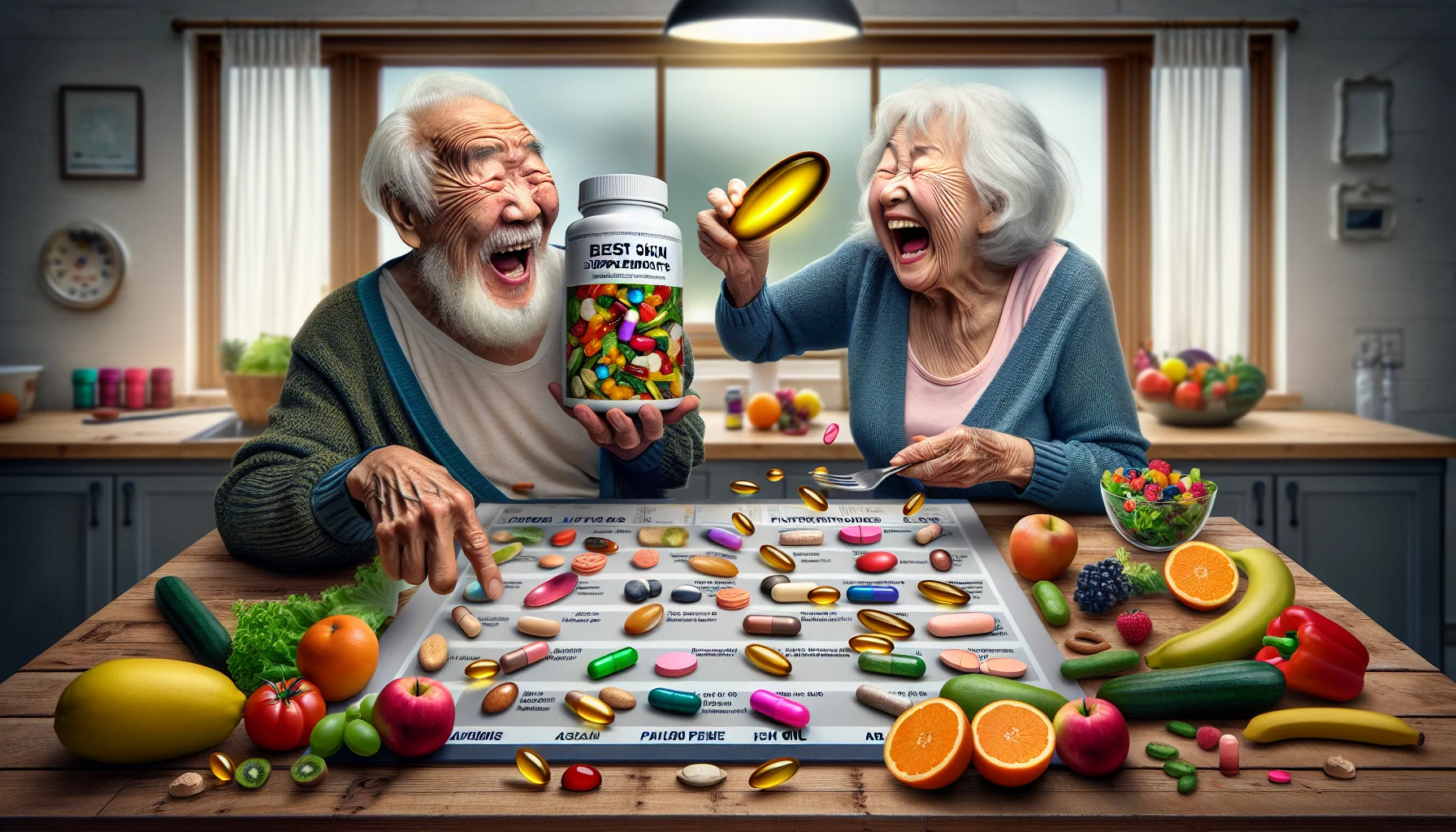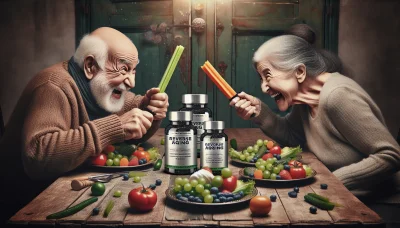Best skin supplements for aging Quiz
Test Your Knowledge
Question of
Understanding Skin Aging and Nutritional Needs
Causes of Skin Aging
Environmental Factors: The sun's ultraviolet rays are notorious for accelerating skin aging, leading to wrinkles and age spots. Pollution and exposure to harsh weather conditions further exacerbate the skin's deterioration, stripping away its natural oils and elasticity.
Genetic Predisposition: Genetics play a crucial role in how our skin ages. Some individuals inherit traits that make their skin more resilient, while others may be more prone to early signs of aging due to their genetic makeup.
Lifestyle Choices: Smoking, excessive alcohol consumption, and inadequate sleep can all lead to premature skin aging. These habits disrupt the skin's ability to repair itself and maintain its youthful appearance.
Essential Nutrients for Healthy Skin
Vitamins and Their Roles: Vitamins are pivotal in maintaining skin health. Vitamin C is essential for collagen production, while Vitamin E protects against oxidative stress. Vitamin A helps with skin cell regeneration, keeping the skin firm and vibrant.
Minerals and Antioxidants: Zinc aids in healing and rejuvenation, whereas selenium shields the skin from environmental damage. Antioxidants neutralize free radicals that can accelerate aging.
Fatty Acids and Hydration: Omega-3 fatty acids are vital for maintaining the skin's lipid barrier, which locks in moisture. Adequate hydration ensures that the skin remains plump, reducing the appearance of fine lines.
How Diet Affects Skin Health
Impact of Hydration on Skin: Water is foundational for maintaining optimal skin hydration levels. Dehydrated skin can become dry and flaky, highlighting wrinkles more prominently.
- To maximize hydration, drink at least eight glasses of water daily.
- Incorporate water-rich foods like cucumbers and watermelons into your diet.
- Avoid excessive amounts of caffeine and alcohol as they can dehydrate your body.
- Use hydrating skincare products to support your skins moisture balance from the outside.
Role of Balanced Diet in Skin Elasticity: A balanced diet rich in proteins, vitamins, and minerals supports the maintenance of elastin fibers that give the skin its elastic quality. Neglecting these nutrients can lead to saggy, aged-looking skin.
Detrimental Foods for Skin Aging: High-sugar diets can lead to glycation, which damages collagen and elastin. Processed foods high in trans fats contribute to inflammation that accelerates aging. Opting for whole foods can significantly enhance skin health over time.
Top Supplements for Youthful Skin
Antioxidant Supplements
Antioxidants are the secret guardians of your skin, tirelessly protecting it from the relentless assault of free radicals. These molecular marauders are known to accelerate aging, but with the right antioxidants in your arsenal, you can fend off their attacks and maintain that radiant glow. It's like having an invisible shield, keeping your skin youthful and vibrant!
Vitamin C for Collagen Production : Unleash the power of Vitamin C, a mighty ally in your quest for youthful skin! This essential nutrient is not just a common cold's nemesis; it's a champion of collagen synthesis. Collagen is the scaffolding of your skin, and Vitamin C ensures this structure remains robust and firm, warding off unsightly wrinkles and sagging.
Vitamin E to Combat Free Radicals : Imagine a warrior whose sole purpose is to protect your skin cells from oxidative stress. That warrior is Vitamin E, an antioxidant superhero that shields your skin from environmental threats while providing deep moisturization. It's a double-edged sword against aging!
Coenzyme Q10 for Cellular Energy : CoQ10 isn't just an antioxidant; it's the spark plug of cellular energy within your skin. As we age, our natural levels of CoQ10 decline, but supplementing can recharge your cells, promoting a more youthful and energetic complexion. It's like turning back the clock on your skin's life cycle!
Collagen Boosting Supplements
The quest for supple, plump skin leads many to the holy grail of youthfulness: collagen. But as our body's production wanes with age, we turn to collagen boosting supplements as our knights in shining armor. By bolstering our natural reserves, these supplements are pivotal in maintaining the resilience and elasticity that define youthful skin.
Hydrolyzed Collagen Peptides : Unlock the secret to a fountain-like flow of collagen with hydrolyzed peptides. These small, easily absorbed molecules dive deep into your system, encouraging your body to ramp up its own collagen production. The result? A firmer, smoother complexion that defies the years.
Marine Collagen Benefits : Dive into the depths of marine collagen benefits where fish-derived peptides offer superior absorption and bioavailability. This oceanic treasure is believed to revitalize skin by improving hydration and elasticity - think of it as casting a rejuvenating spell on your complexion.
- Collagen-Enhancing Nutrients : To truly harness collagen's potential, consider pairing it with synergistic nutrients such as Vitamin C or hyaluronic acid. They're like cheerleaders encouraging collagen to perform at its best!
- Avoid sugar and excessive sun exposure as they can break down collagen faster than you can say "wrinkle".
- Consistency is key make collagen supplementation part of your daily ritual for results that are not just seen but sustained.
- Quality matters invest in high-quality supplements with transparent sourcing to ensure you're getting the most potent form of this youth-preserving protein.
Omega-3 Fatty Acids
Imagine Omega-3s as the ultimate nourishment for your skin barrier - they're like essential 'skin food' that fortifies and soothes your largest organ. Omega-3 fatty acids are renowned for their anti-inflammatory properties which help calm irritated skin while promoting a smoother, more even-toned appearance.
Benefits of EPA and DHA : EPA and DHA are like master craftsmen specialized in repairing and refining your skin's texture. These specific Omega-3s work diligently behind the scenes to reduce inflammation and support healthy cell membranes resulting in a complexion thats not only clear but also resilient against aging aggressors.
Plant-Based Omega-3 Sources : For those who tread lightly on our planet preferring plant-based options - fear not! Flaxseeds, chia seeds, and walnuts are packed with ALA Omega-3s ready to be transformed by your body into the EPA and DHA it craves, ensuring no one misses out on these lipid-layer loving nutrients.
Omega-3s for Skin Barrier Function : Fortify your fortress! Omega-3 fatty acids play a critical role in maintaining the integrity of your skin barrier - think of them as bricks strengthening a wall against external irritants. Regular intake helps keep your barrier robust which translates into healthier-looking skin that retains moisture better than ever before!
Herbal Supplements and Skin Rejuvenation
Green Tea Extracts
Anti-Inflammatory Properties: Green tea extracts are a powerhouse of benefits, thanks to their anti-inflammatory agents. These compounds significantly reduce redness and inflammation, making them a go-to for those battling with conditions like rosacea or acne.
Polyphenols and UV Protection: The polyphenols in green tea are not just ordinary antioxidants; they offer a robust shield against the sun's harmful UV rays. Incorporating green tea extracts into your skincare routine can add an extra layer of protection for your skin.
Green Tea vs. Skin Oxidative Stress: Green tea is a formidable opponent against oxidative stress, which is known to accelerate aging. Its extracts help maintain the integrity of the skin by neutralizing free radicals that can cause fine lines and wrinkles.
Curcumin and Turmeric Benefits
Curcuminoids in Skin Repair: Curcuminoids, the active compounds in turmeric, play a crucial role in skin repair. They boost the skin's natural healing process, helping to repair scars and wounds at an accelerated rate.
Turmeric for Skin Brightening: Turmeric isn't just for cooking; it's also a fantastic skin brightener. Its properties help even out skin tone, fade dark spots, and impart a radiant glow that's hard to miss.
Anti-Aging Effects of Curcumin: Say goodbye to fine lines and hello to youthful skin! Curcumin has remarkable anti-aging effects that support skin elasticity and keep your complexion looking smooth and supple.
Adaptogens for Stress and Skin Health
Ashwagandha and Cortisol Reduction: Ashwagandha is not only stress-relieving but also beneficial for your skin. By lowering cortisol levels, it helps prevent stress-induced breakouts and maintains a clear, glowing complexion.
Rhodiola Rosea for Improved Resilience: Rhodiola Rosea enhances the skin's resilience to environmental stressors. This adaptogen strengthens the skin's defenses, making it less prone to damage from pollutants and other irritants.
- Ginseng for Metabolic Balance: Ginseng is celebrated for its ability to balance metabolism. A well-regulated metabolism can lead to healthier skin by improving overall wellness.
- Avoid excessive sun exposure while using products containing green tea extracts as they can increase sensitivity to UV rays.
- Incorporate curcumin supplements with caution if you have gallbladder issues; curcumin can exacerbate gallbladder problems.
- Ashwagandha may interact with thyroid medications; consult with a healthcare provider before combining them with thyroid treatments.
- Rhodiola Rosea might cause dryness or irritation when applied topically; always perform a patch test first.
- Ginseng should be used carefully by those with hormone-sensitive conditions due to its estrogen-like effects.
Probiotics, Gut Health, and Skin Appearance
Understanding the Gut-Skin Axis
The connection between gut health and skin appearance is a fascinating area of study. Researchers have discovered that the gut microbiome plays a crucial role in influencing systemic inflammation, which can directly impact skin health. A well-balanced gut microbiota helps maintain the body's immune response, reducing inflammatory processes that could otherwise manifest on the skin.
When it comes to skin conditions like acne, eczema, or psoriasis, there's growing evidence that gut dysbiosisa microbial imbalance in the gutmay be a contributing factor. This imbalance can trigger inflammatory responses that exacerbate these skin issues. By addressing gut health, we may find new avenues for managing and improving various dermatological conditions.
Probiotics have emerged as potential allies in regulating the immune system and maintaining gut barrier integrity. Their use can help prevent pathogenic invasions that lead to inflammation while also nurturing beneficial bacterial colonies in the gut. This regulation is essential for preventing immune system overreactions that could affect the skin.
Microbiome and Inflammation Link
The human microbiome is an ecosystem of bacteria living harmoniously within our bodies. When this balance is disrupted, it can lead to increased inflammation throughout the body, including the skin. Inflammatory skin conditions like acne and rosacea are often associated with signs of inflammation in the gut.
Gut dysbiosis can trigger an upsurge in systemic inflammation, negatively affecting the bodys largest organthe skin. This link underscores the importance of a healthy gut microbiome for managing inflammatory responses and maintaining clear, healthy skin.
Gut Dysbiosis and Skin Conditions
Skin conditions such as acne, eczema, and psoriasis may be reflections of an imbalanced gut microbiome. The presence of certain harmful bacteria in the gut can activate immune responses that lead to flare-ups on the skin's surface. By restoring microbial balance through probiotics, we might alleviate some of these dermatologic symptoms.
A balanced gut microbiome supports a strong intestinal barrier, which shields against environmental toxins and pathogens that could inflame the skin. Targeted probiotic therapies are becoming more popular as a means to restore this balance and promote healthier skin from within.
Probiotics for Immune Regulation
Probiotics play a pivotal role in educating and regulating our immune system. They interact with immune cells, promoting tolerance and reducing hypersensitivity reactions that could manifest as skin problems. Regular intake of probiotics may help temper these reactions by supporting a balanced immune function.
By enhancing mucosal immunity through probiotic consumption, we reinforce our body's defenses against pathogenic bacteria that cause inflammation. This bolstered defense mechanism contributes to both improved gastrointestinal health and better overall skin appearance.
Best Probiotic Strains for Skin Health
Different strains of probiotics offer unique benefits for skin health. Lactobacillus , one of the most researched genera, has been shown to protect against pathogens and reduce inflammationtwo factors critical for maintaining clear skin. These strains can help manage conditions like acne by modulating the body's inflammatory responses.
Bifidobacterium species are known for their role in enhancing gut barrier function, which in turn helps maintain proper hydration levels in the skin. Adequate hydration is vital for preventing dryness and promoting a radiant complexion.
- Saccharomyces boulardii: A yeast-based probiotic effective at reducing symptoms of eczema and other inflammatory skin conditions.
- Lactobacillus reuteri: Known for its anti-inflammatory properties that can help improve acne-prone skin.
- Lactobacillus rhamnosus: May enhance immune response to reduce allergic reactions linked to skin flare-ups.
- Bifidobacterium longum: Helps improve gastrointestinal health which is often reflected in clearer, healthier-looking skin.
Prebiotics and Their Importance
Prebiotics are non-digestible dietary fibers that feed beneficial bacteria in our guts. They are just as important as probiotics because they ensure that good bacteria thrive and maintain a healthy digestive systema key component in achieving optimal skin health.
The combination of prebiotics with probiotics creates a synergistic effect known as synbiotics; together they enhance each other's benefits leading to greater improvements in digestive health than when used separately. This synergy supports a robust microbiome which reflects positively on your complexion.
Inclusion of prebiotic-rich foods like garlic, onions, bananas, and oats can boost digestive health significantly. Consuming these fibers encourages growth of beneficial bacteria which contributes to balanced digestionand by extensionbetter looking skin!
Diet Modifications to Support Skin Anti-Aging
Anti-Inflammatory Diets
Embarking on an anti-inflammatory diet is a game-changer for skin health. It's all about embracing foods that fight inflammation and rejecting those that exacerbate it. By doing so, you're not just soothing your skin but also fortifying your body's defenses against a host of diseases.
What you eat can visibly reflect on your skin, and the Mediterranean diet is a powerhouse of anti-aging benefits. It's rich in omega-3 fatty acids, antioxidants, and fibers which collectively work to reduce inflammation and nourish your skin from within.
Mediterranean Diet Principles
The Mediterranean diet is not just a diet; it's a lifestyle! It prioritizes plant-based foods like fruits, vegetables, whole grains, nuts, and seeds. Olive oil is the primary fat source, replacing butter or margarine, which can help maintain youthful skin.
Anti-Inflammatory Foods to Include
Your anti-aging arsenal should be stocked with vibrant fruits and vegetables like berries, leafy greens, and tomatoes. Don't forget about healthy fats found in avocados, nuts, and fatty fish they're your allies in maintaining supple skin.
Foods to Avoid in an Anti-Inflammatory Diet
Beware of processed foods and sugars! They are the culprits behind inflammation spikes. Reducing intake of refined carbs and fried foods can significantly improve your skin's resilience to aging.
Hydration and Skin Elasticity
Water is the elixir of lifeand the secret ingredient for radiant skin. Keeping hydrated ensures that your skin stays plump, elastic, and less prone to wrinkles.
Importance of Water Intake
Water intake is crucial; it flushes out toxins and keeps cells turgid. Aim for at least 8 glasses a day to maintain optimal hydration levels for youthful-looking skin.
Hydrating Foods for Daily Diet
Incorporate hydrating heroes like cucumbers, watermelons, oranges, and strawberries into your diet. These foods are teeming with water content and vital nutrients that support skin hydration from within.
- Cucumbers: Over 95% water content.
- Watermelons: Rich in vitamins A & C plus hydrating fluids.
- Oranges: Packed with water and vitamin C for collagen production.
- Strawberries: Full of antioxidants and water for skin repair.
Signs of Dehydration Affecting the Skin
Dryness, dullness, and more pronounced fine lines could be signaling dehydration. Listen to your skinit might be crying out for moisture!
Low Glycemic Index Foods for Skin Health
A low glycemic index (GI) diet isn't just good for your waistline; it's fantastic for fending off wrinkles too! High GI foods can trigger insulin spikes leading to inflammationa nemesis of youthful skin.
Understanding Glycemic Index and Skin Aging
The glycemic index measures how quickly food raises blood sugar levels. Low GI foods release sugar gradually into the bloodstream, helping prevent the inflammation cascade that accelerates aging.
Low GI Foods That Benefit the Skin
To keep your skin looking its best, feast on low GI stars like sweet potatoes, quinoa, legumes, and non-starchy vegetables. These foods are not only kind on your blood sugar but also packed with age-defying nutrients!
- Sweet Potatoes: Vitamin-rich with a lower GI than white potatoes.
- Lentils & Legumes: Great protein sources that balance blood sugar levels.
- Oats: Slow-releasing carbs that keep you full and your skin clear.
- Cashews: Low GI nuts providing essential fatty acids for healthy skin barrier function.
Balancing Blood Sugar for Skin Vitality
Maintain a steady blood sugar level by pairing carbs with proteins or fats. This balance is key to preserving both your health and that youthful glow!
Lifestyle Changes to Enhance Dietary Benefits
Importance of Sleep in Skin Regeneration
Optimal sleep is a cornerstone of skin health, acting as a regenerative period where skin cells repair and renew themselves. Lack of sufficient sleep can disrupt this vital process, leading to visible signs of aging and a dull complexion. Prioritizing sleep is therefore essential for maintaining a youthful and radiant skin appearance.
A consistent sleep cycle helps regulate the hormones that affect skin's elasticity and hydration. Growth hormone, released during deep sleep, plays a critical role in tissue repair, while cortisol, the stress hormone, can break down collagen when in excess due to poor sleep patterns. Balancing these hormones through adequate rest can significantly enhance your skin's natural beauty.
Tips for Improving Sleep Quality
- Maintain a regular sleep schedule by going to bed and waking up at the same times every day.
- Create a restful environment with minimal light and noise pollution.
- Avoid stimulants like caffeine and electronics before bedtime.
- Invest in comfortable bedding that supports a good night's rest.
- Incorporate relaxation techniques such as meditation or reading into your nighttime routine.
Sleep deprivation can wreak havoc on the skin, resulting in increased inflammation, acne breakouts, and exacerbated skin conditions like eczema or psoriasis. Furthermore, chronic lack of sleep can impede the skin's ability to retain moisture, leading to dehydration and fine lines. Ensuring adequate rest is thus crucial for both preventative and reactive skincare measures.
Stress Management Techniques
The link between stress and skin health is undeniable; stress triggers inflammatory responses that can aggravate skin conditions such as acne or rosacea. Managing stress effectively is not only beneficial for mental well-being but also for achieving clear and glowing skin. By adopting stress-reduction strategies, you can mitigate these adverse effects on your skin.
Mindfulness practices have gained acclaim for their ability to reduce stress levels significantly. Techniques such as meditation, yoga, or deep-breathing exercises help activate the body's relaxation response, countering the negative impact of stress on skin health. Incorporating these practices into your daily routine can lead to visible improvements in your complexion.
Physical activity serves as an excellent stress reliever by boosting endorphin levels often referred to as 'feel-good' hormones. Regular exercise contributes not only to overall fitness but also promotes better circulation and detoxification through sweat, which in turn benefits skin clarity and vitality. Engage in activities you enjoy to maintain consistency in your exercise regimen.
Sun Protection and Skincare Routines
Daily application of sunscreen is one of the most effective ways to protect the skin from harmful UV rays that cause premature aging and increase the risk of skin cancer. Sunscreen acts as a shield against photodamage that leads to wrinkles, fine lines, and pigmentation issues. It should be integrated into your daily skincare routine regardless of weather conditions or indoor activities.
Beyond sunscreen, wearing protective clothing like wide-brimmed hats or UV-blocking sunglasses provides an additional layer of defense against sun exposure. These accessories are not only stylish but also functional in maintaining optimal skin health by preventing direct sunlight from causing damage to sensitive facial areas.
Complementing your diet with appropriate skincare products enhances their dietary benefits exponentially. Choose products with antioxidants that fight free radicals or those with hydrating properties that support the natural barrier function of the skin. Tailoring your skincare regime based on individual needs will maximize the effectiveness of both dietary intake and topical applications.












